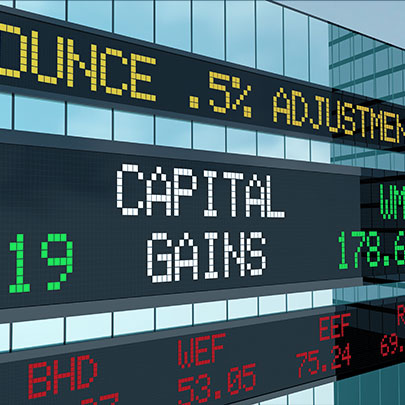Gains Can Be Taxing

Should the proposed hike to the top end of the capital gains tax find its way into law, there will be an impact on some high earners. However, our analysis of the impact on the economy and stock market produces a surprising result.
Contributed by Doug Walters , Max Berkovich , ,
Taxes tend to fuel emotion. That was on display this week as the White House unveiled its plan to pay for its proposed American Families Plan in part with a higher capital gains tax. Investors should be asking two questions: Will these changes hurt the economy? Will these changes impact me personally?
Let’s take the second question first. So, what is the proposal? On the table is a plan to raise the capital gains tax on individuals and households earning $1 million or more from a top rate from 20% to 39.6%. Including the Medicare surtax of 3.8%, that is a top rate of 43.4%. Part of the selling point from the White House is that less than one-half of one percent of households will be impacted. If your annual income is not approaching $1 million, then you likely will not be impacted.
At this point, it is important to point out that none of this is set in stone. In fact, negotiations will almost certainly see a lowering of the proposed rates. Also, if you are considering taking gains now while the rate is still low, think again. In the past, capital gains rate increases have been retroactive to the beginning of the year. In other words, it’s likely too late.
On to the second question. Should we be worried about the impact of these policies on the economy? This question falls squarely in the category of prediction, which is a place we do not go. Instead, we prefer to focus on evidence from the past. We ran an analysis looking at the impact of past capital gains tax changes on both the economy and the stock market. Somewhat surprisingly, GDP has actually tended to rise in the year after a capital gains increase. But the relationship is quite weak, and the real conclusion is that there is no meaningful relationship between changes to the capital gains laws and either the economy or stock market.
The capital gains story is still unfolding. For now, there is little for investors to do but wait and see how the legislation shakes out. Those lucky enough to be at risk of being impacted should work with their advisor and accountant to ensure that the changes are considered within their financial plan.

Proposed top end capital gains tax
The White House is proposing to raise the capital gains tax on individuals and households earning $1 million or more from a top rate of 20% to 39.6%. However, that number may come down in negotiations.
Headlines This Week
Economic Pulse
- In the U.S., we see commodities like lumber and copper at an all-time high, with both tying in closely with industrial economic activity.
- The prices for goods and labor are also on the rise. The proposed increase of the Federal minimum wage to $15/hour has been seen in the labor market already from companies like Amazon, Costco, Target, and many others.
- Shortages in the semiconductor chips (used to manufacture electronic components) may fuel price increases and hinder the growth within the auto industry, computers, phones, kitchen appliances, and other electronic devices.
- Thanks to the third round of pandemic relief checks, U.S. personal income soared in March by 21.1%, the most in monthly records going back to 1946 when the Commerce Department started keeping track. Meanwhile, purchases of goods and services increased 4.2% as well. Both numbers came in better than the already optimistic predictions. The personal savings rate also jumped 27.6% in March.
- Gross Domestic Product for the first quarter of the year expanded by 6.4% annualized rate.
- The Federal Reserve’s favorite measure of inflation, Personal Consumption Expenditure (PCE), rose 2.3% in March. This is the biggest gain since 2018.
Earnings
- Over 60% of companies in the S&P 500 index have reported earnings.
- Thus far, all sectors (except Energy) have either beat or met their earnings estimates.
- The sectors that exceeded their estimates the most are Financials and Technology. FAANG stocks, Facebook (FB), Amazon (AMZN), Apple (APPL), Netflix (NFLX), and Alphabet (GOOG), saw double-digit sales growth.
The Week Ahead
Unemployment Dropping
Friday will see the release of April’s non-farm payroll numbers, with the US economy on course to have added another 925k jobs.
- If this forecast is accurate, the unemployment rate will drop to a new post-pandemic low of 5.8%.
- Of note is that the Fed has become increasingly skeptical of the official jobs data, indicating that it believes the true jobless rate is much higher due to people leaving the labor market altogether.
- The labor participation rate has begun to steady though, around 61.5%, but remains materially lower than the pre–pandemic rate of 63.4%.
Vaccine Earners
Pfizer’s (PFE) and Moderna’s (MRNA) Q1 earnings reports are expected to be the highlight of next week’s reporters.
- Both companies have seen their earnings surge from the production of their respective Covid vaccines that have seen widespread rollout in the US and abroad.
- Pfizer is forecasting $15bn in additional sales in 2021, increasing to $62.5bn. In 2019, revenues were at $41.2bn, amounting to over 50% growth in just two years.
- Moderna has seen revenues skyrocket, with 2020 Q4 bringing in $570m from just $14m a year before.
- In April, Moderna signed a deal with Sanofi to manufacture another 200m doses in the US, adding to their massive $18.4bn of vaccine deals already secured. Investors will be watching to see if either company can overcome its high expectations next week.
- Another health care name to keep an eye on is CVS Health Corp. (CVS), reporting Tuesday.
Britain Back on Track
The Bank of England will meet next Thursday for its third interest rate decision of the year in addition to the release of its monetary policy summary.
- The prognosis of the British economy has made a remarkable turnaround after leading the continent in its vaccine rollout.
- The possibility of negative interest rates on the table at the beginning of the year has now been put to the side with the economy reopening.
- No drastic changes are expected next week, although the rapid turnaround has some wondering if hints of tapering the Bank’s quantitative easing program will appear.
About Strategic
Founded in 1979, Strategic is a leading investment and wealth management firm managing and advising on client assets of over $2 billion.
OverviewDisclosures
Strategic Financial Services, Inc. is a SEC-registered investment advisor. The term “registered” does not imply a certain level of skill or training. “Registered” means the company has filed the necessary documentation to maintain registration as an investment advisor with the Securities and Exchange Commission.
The information contained on this site is for informational purposes and should not be considered investment advice or a recommendation of any particular security, strategy or investment product. Every client situation is different. Strategic manages customized portfolios that seek to properly reflect the particular risk and return objectives of each individual client. The discussion of any investments is for illustrative purposes only and there is no assurance that the adviser will make any investments with the same or similar characteristics as any investments presented. The investments identified and described do not represent all of the investments purchased or sold for client accounts. Any representative investments discussed were selected based on a number of factors including recent company news or earnings release. The reader should not assume that an investment identified was or will be profitable. All investments contain risk and may lose value. There is no assurance that any investments identified will remain in client accounts at the time you receive this document.
Some of the material presented is based upon forward-looking statements, information and opinions, including descriptions of anticipated market changes and expectations of future activity. Strategic Financial Services believes that such statements, information, and opinions are based upon reasonable estimates and assumptions. However, forward-looking statements, information and opinions are inherently uncertain and actual events or results may differ materially from those reflected in the forward-looking statements. Therefore, undue reliance should not be placed on such forward-looking statements, information and opinions.
No content on this website is intended to provide tax or legal advice. You are advised to seek advice on these matters from separately retained professionals.
All index returns, unless otherwise noted, are presented as price returns and have been obtained from Bloomberg. Indices are unmanaged and cannot be purchased directly by investors.

 Doug Walters
Doug Walters